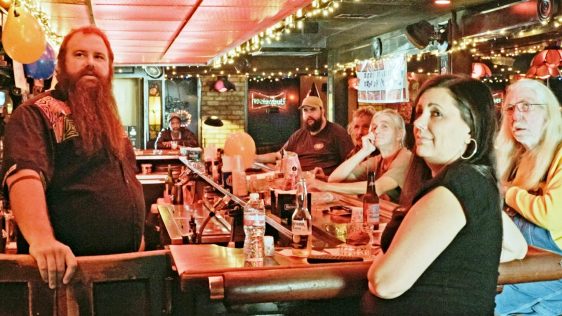 An amazing simulated documentary celebrates the world of neighborhood bars: the situation is invented, but the people are real.
An amazing simulated documentary celebrates the world of neighborhood bars: the situation is invented, but the people are real.
If you’ve ever gone to a neighborhood bar frequently, for a year or more, you know that a place like that has what they call “regulars,” folks that are there day after day, for whom the bar is a kind of second home or community. And among these regulars you hear many conversations, more or less inebriated, usually more, and many jokes and stories. You may also discover some complicated relationships. The experiences you’ve had in this bar are transient and hard to pin down, soaked as they are in alcohol and other drugs, and expressed through the eccentric mannerisms and ways of speaking displayed by the regulars. It’s hard to imagine these experiences captured on film with any accuracy—so it’s with a sense of wonder that I introduce a film released last year, directed by two brothers, Bill and Turner Ross, entitled Bloody Nose, Empty Pockets.
The title, as far as I can tell, is throwaway slang for the rough existence of the kind of lowlife booze hounds we meet in the film. A dive bar in Las Vegas called The Roaring 20s has announced that it will be closing its doors for good, for unstated, presumably economic reasons. We follow the goings-on at the bar on its final day, from when it opens in the late morning to the last call in the morning’s wee hours. For about a hundred minutes, the film introduces us to the various regulars who come to celebrate their favorite hang-out on its finale. There’s blond long-haired Michael, an alcoholic who looks twenty years older than his actual age, who helps sweep the floor when he arrives in the morning, and then keeps drinking through the rest of the film. There’s a black veteran named Bruce, who interrupts lengthy periods of silence with desperate jokes and thoughts about possible conspiracies. There’s the older lady who gets sad and sloppy when she drinks and talks about how much she loves everybody. There’s a burly young guy who drinks steadily and intensely, with nowhere to go because he’s estranged from his family, and who ends up dropping acid at one point during the evening, and becoming transfixed by the bizarre dramas occurring right in front of him. And there’s the kindly woman bartender worried about her teenage kid getting wasted in the alley outside. That is just a small sample of the many people we meet in the course of the film.
This all seems like a documentary, because the people and their behavior are so true to life, and it sounds and feels like a real bar. But Bloody Nose, Empty Pockets is more like what I would call a docudrama. The Ross brothers recruited the most interesting barflies they could find, constructed this bar which was actually a set in New Orleans, gave the people loose narrative arcs and then had them improvise all their dialogue, with two cameras roving about trying to catch all the details.
Now, if you feel cheated by that, okay, but I think the heightened effect that the directors attained was well worth it. These people have lived the life they’re portraying, and I would remind you that art is not an escape from reality, but an immersion in it. I’ve never seen a film that reproduces the experience of being in a busy dive bar as well as this film does. I recognize these people. I actually was some of these people at one time. There’s joy and humor here, with a kind of devil-may-care approach to life, but there’s also deep sadness, and the film doesn’t turn its gaze away from that, either. Once you’ve come to the end of Bloody Nose, Empty Pockets, you’ve seen the struggle and the pain that the people at the bar may not always see in themselves, yet you’ve also watched a film that treats human beings, no matter how far down they seem to have sunk, with a truthfulness that is the essence of compassion and respect.

Five films from British director Steve McQueen, depicting the experiences of West Indian British families in London from the late 1960s through the 80s,...

A street kid fights for survival in Lebanon, in Nadine Labaki’s heart wrenching new film. Nadine Labaki is a Lebanese writer-director whose three feature...

The work of the film innovator who brought fantasy and illusion to the movies, is presented in a documentary and a collection of Georges...